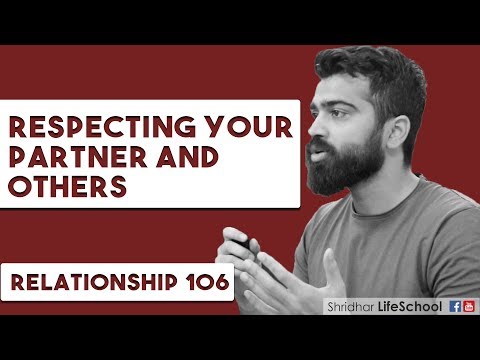Respect in a relationship is an essential foundation that cultivates trust, understanding, and harmony between partners. It encompasses the admiration and recognition of each other’s individuality, boundaries, and opinions. When both individuals respect one another, they create a safe and nurturing environment where open communication and empathy thrive. Mutual respect encourages active listening, valuing each other’s perspectives, and considering each other’s feelings in decision-making processes. Moreover, it involves treating one another with kindness, fairness, and appreciation, fostering a deep sense of love and support. In a respectful relationship, conflicts are approached with patience and understanding, allowing for healthy resolution and growth. Respect forms the basis for a partnership built on equality, where both individuals feel empowered and valued. It encourages personal growth and fosters an environment where both partners can flourish and achieve their goals. Ultimately, respect in a relationship creates a strong and lasting bond, filled with love, trust, and happiness.

Understanding Respect in a Relationship
| Aspect of Respect | Description |
|---|---|
| Communication | Respectful communication involves active listening, empathy, and open-mindedness. It means valuing each other’s opinions and expressing thoughts and feelings honestly and constructively. |
| Boundaries | Respecting boundaries means recognizing and honoring each other’s personal space, privacy, and individuality. It involves refraining from controlling or manipulating behaviors and allowing each partner to have autonomy. |
| Equality | Respect in a relationship requires treating each other as equals. It entails acknowledging and appreciating each other’s strengths, contributions, and perspectives without any sense of superiority or inferiority. |
| Support | Being respectful involves providing emotional support and encouragement to your partner. It means being there for them during challenging times, celebrating their achievements, and helping them grow and pursue their goals. |
| Trust | Respectful relationships are built on trust. Trust involves being honest, reliable, and faithful to one another. It means keeping promises, respecting confidentiality, and having faith in each other’s intentions and actions. |
| Conflict Resolution | Respectful conflict resolution entails addressing disagreements calmly and respectfully. It means avoiding insults, belittling, or demeaning language. Instead, it focuses on finding mutually beneficial solutions and understanding each other’s perspectives. |
In a truly respectful relationship, partners communicate effectively, establish healthy boundaries, promote equality, provide support, build trust, and handle conflicts in a constructive manner. By practicing these aspects of respect, couples can foster a strong and harmonious connection, promoting happiness and longevity in their relationship.
“The Art of Mutual Respect: Nurturing Healthy Bonds”
The Importance of Respect in a Relationship
In any relationship, whether it be romantic, platonic, or professional, respect is a fundamental aspect that sets the foundation for a healthy and fulfilling connection. Respect goes beyond common courtesy and politeness; it encompasses trust, empathy, and understanding. Without respect, relationships can become toxic and detrimental to our well-being. In this article, we will explore what respect truly means in a relationship and why it is of utmost importance.
1. Mutual Understanding and Acceptance
A relationship built on respect requires a mutual understanding and acceptance of each other’s thoughts, feelings, and boundaries. It involves acknowledging and valuing the differences between individuals while embracing them. When both parties in a relationship feel understood and accepted, it creates a safe and nurturing environment where growth and intimacy can flourish.
Respect also involves recognizing that each person is entitled to their own opinions and beliefs. It means refraining from belittling or dismissing someone’s thoughts, even if they differ from our own. By fostering an environment of mutual understanding and acceptance, we lay the groundwork for open and honest communication.
2. Trust and Support
Trust and support are crucial components of a respectful relationship. Trust is the foundation upon which any relationship is built, and without it, there can be no true connection. When we trust someone, we believe in their character and integrity. We have faith that they will act in our best interest and keep their promises.
Supporting our partner means being their cheerleader, their confidant, and their rock. It means standing by their side through both triumphs and tribulations. When we support our loved ones, we show them that we value their dreams and aspirations. We encourage them to be their authentic selves and provide them with the emotional support needed to navigate life’s challenges. This unwavering support helps foster a sense of security and stability within the relationship.
3. Communication and Active Listening
In a respectful relationship, effective communication is key. It involves both parties expressing their thoughts, feelings, and needs openly and honestly. Respectful communication creates an environment where individuals feel heard and understood.
Active listening is an essential aspect of respectful communication. It means giving our undivided attention to our partner and genuinely seeking to understand their perspective. By actively listening, we show respect for their thoughts and feelings. It also helps us avoid jumping to conclusions or making assumptions, thus preventing misunderstandings and conflicts.
4. Empathy and Compassion
Empathy and compassion are vital qualities that contribute to a respectful relationship. Empathy involves putting ourselves in our partner’s shoes and understanding their emotions and experiences. It requires us to set aside our own biases and judgments to truly connect with their feelings.
Compassion goes hand in hand with empathy. It is the act of showing kindness, understanding, and support to our partner during difficult times. When we approach our loved ones with empathy and compassion, we create a safe space for vulnerability and emotional intimacy.
5. Boundaries and Autonomy
Respect also involves recognizing and honoring each other’s boundaries and autonomy. Boundaries are the limits we set for ourselves in terms of what we are comfortable with and what we are not. They can pertain to physical, emotional, or psychological aspects of the relationship.
Respecting boundaries means understanding and accepting our partner’s limits without pressuring or coercing them into crossing them. It means seeking consent and not assuming anything without explicit communication. Respecting boundaries allows individuals to maintain their autonomy and individuality within the relationship.
In Conclusion
Respect forms the bedrock of any successful and fulfilling relationship. It entails mutual understanding, trust, support, effective communication, empathy, compassion, and honoring boundaries. When respect is present, relationships thrive, and individuals feel valued, cherished, and secure. It is through respect that we foster deep connections and build a solid foundation for long-lasting and meaningful relationships.
List of What is Respect in a Relationship:
- Listening to and valuing each other’s opinions
- Being honest and trustworthy
- Respecting boundaries and personal space
- Supporting each other’s goals and dreams
- Showing appreciation and gratitude
- Empathizing and being understanding
- Communicating openly and respectfully
- Being accountable for one’s actions
- Acknowledging and accepting differences
- Treating each other with kindness and compassion

